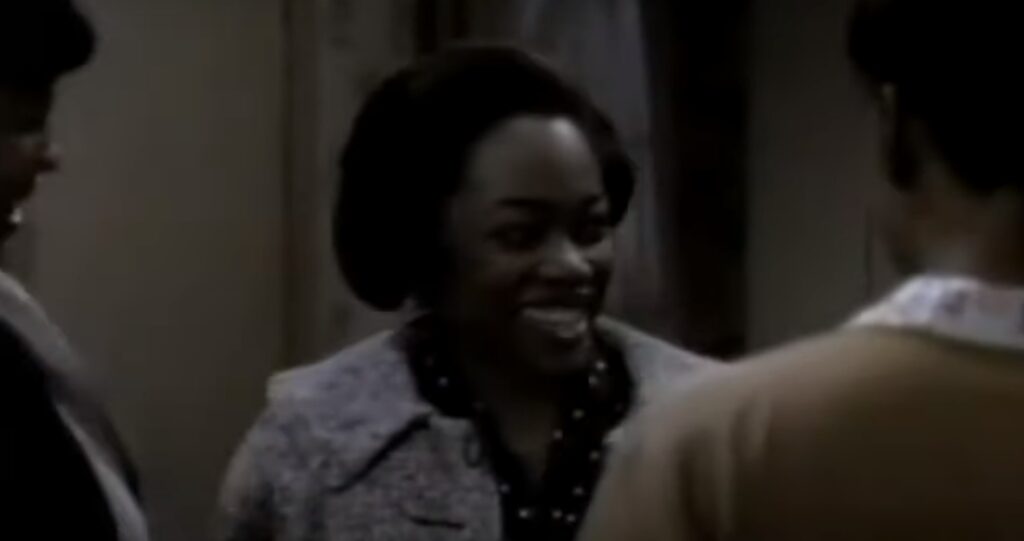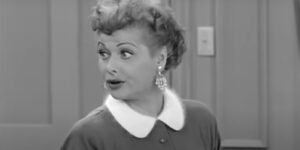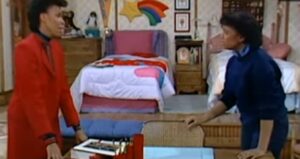
Today, we look at how Lilly on I’ll Fly Away made a bold protest, which had both negative and positive repercussions.
This is “All the Best Things,” a spotlight on the best TV episodes, movies, albums, etc.
This is a Year of Great TV Episodes, where every day this year, we’ll take a look at great TV episodes. Note that I’m not talking about “Very Special Episodes” or episodes built around gimmicks, but just “normal” episodes of TV shows that are notable only because of how good they are.
All this month, I’ll be spotlighting great Black-centric TV episodes.
Created by John Falsey and Joshua Brand a year after they created the critical hit, Northern Exposure (and years after the pair created another critical darling, St. Elsewhere), I’ll Fly Away debuted in 1991, and while critically acclaimed, didn’t get quite the same critical attention as those other two series, which highly irritated one of the show’s writers and producers, David Chase (who would later, of course, create one of the most acclaimed TV series of all-time, The Sopranos), who was quoted in Brett Martin’s excellent book, Difficult Men: Behind the Scenes of a Creative Revolution: From The Sopranos and The Wire to Mad Men and Breaking Bad, as saying “The people who worked on Northern Exposure thought they were curing cancer and reinventing drama. To me, it was so precious, so self-congratulatory. It strained so hard for whimsy. We’d go to the Emmys every year and they’d get these awards and we’d get nothing. It wasn’t that we really wanted these Emmys, but that show was being celebrated to the hilt and I felt it was a fraud at its core” (amusingly, Chase ended up becoming the showrunner on Northern Exposure after I’ll Fly Away was canceled after just two seasons).
I’ll Fly Away told the story of Lilly Harper (Regina Taylor), who, in the late 1950s/early 1960s became the housekeeper/nanny for the family of Forrest Bedford (Sam WatersoN), the District Attorney in a small Southern town (they never outright say it is Georgia, but it is obviously Georgia). Forrest’s wife is in a sanitarium, so he really needs the help. He has two sons, Nathan (Jeremy London), the eldest in the family, and the youngest, John Morgan (John Aaron Bennett), who Lilly essentially raises while Forrest is at work. Forrest also has a daughter, Francie (Ashlee Levitch), who had to deal with her first period with no one to turn to but Lilly.
Forrest has been asked to run for the Attorney General of the state, but at the same time, he keeps finding himself drawn into cases involving civil rights. A Black man struck a White cop during a protest. The cop then recanted his testimony, claiming he had just been injured on a motorcycle accident. Forrest ordered the Black man released, but he wasn’t released until late that night, and then had a “car accident” on the way home. A witness came forward (an old Black man) who witnessed the murder of the released prisoner. Forrest shocked the community by arresting the man who murdered the released prisoner, who Forrest suspects to be a member of the Ku Klux Klan. The Klan member keeps making noise about how he wasn’t alone in his actions, that he has high friends. He is then murdered while being transported to the hospital with stomach pain. Forrest shocked the community AGAIN by helping to investigate, discover and arrest the man behind the assassination. The assassin was a popular former cop. So, basically, the whole White side of town hates Forrest right now.
But meanwhile, Reverend Henry (Roger Aaron Brown), a Black pastor, continues to push for more civil rights for the Black citizens of the town, and after two Black teens try to sit at the segregated lunch counter at the local drug store, Reverend Henry decides that they will try to integrate that lunch counter. He and three other men from church sit at the counter, and are abused, with Henry being arrested. While he is awaiting trial, he calls for a boycott of the drug store by the Black citizens of the town, and he and some men from church picket outside the store, urging Black citizens not go in.
A female churchgoer offered to participate in the protest, but the Reverend told her that no, it was the men’s responsibility. Lilly goes to that church, as well, and she was clearly a bit put off by the Reverend’s response. Meanwhile, Lilly’s cousin, Oscar, is actually the cook at the lunch counter at the drug store, and had been there for years. He disagrees with the protests.
Meanwhile, Forrest has been having an affair with a fellow lawyer in town, Christina LeKatzis (Kathryn Harrold). He has an understanding with his wife, but obviously he doesn’t want anyone else to know about it. It’s awkward when he and Christina are flirting on the street, and Forrest takes a lick of her ice cream cone, only to run into Francine and a friend of hers on the street.
Christina is recruited by the Northern lawyers brought down to defend Reverend Henry in his trial over the lunch counter protest, as they feel that having a local on their side would be helpful. She agrees, which freaks Forrest out.
Forrest Bedford is a fascinating character, as he is not always a sympathetic character. He is surely not some big civil rights advocate, but his sense of honor forces him to push for causes that most other White lawyers of his generation and background would not. He is shocked by Christina being on the other side of the integration case, though, and yells at her, shouting, “Who’s side are you on?”
Lilly then discovers one of the discarded picket signs in the trash while shopping in town (after the protestors were all arrested), and on the spot, she decides that she will pick up the protest. She does so, and she is soon arrested, as well.
This leads to two brilliant scenes between Forrest and Lilly where Forrest TEARS into Lilly, practically making him the VILLAIN of the episode, which is such a bold storytelling choice. He pays her $50 bail, but treats her like she was a fool for putting herself at risk (especially when she’s supposed to be watching his kids). She later calmly tries to slightly argue with him, but he is not having it, and it seems pretty clear that if she protests again, she’ll be out of a job.
A dejected Lilly heads home, and she is shocked that all of her friends and family (save Oscar) have gathered at her place to celebrate her. One of her friends notes that she is proud to know her. Lilly was coming from a point where she felt stupid for the risks of her actions, and suddenly, all of her friends made it clear that there WAS meaning to her actions. It’s such an amazing scene.
There’s a couple of other, lesser plots, in the episode (Nathan is dating a Jewish girl, played by Cara Buono, and his best friend, Paul Slocum, played by Peter Simmons, disapproves, and the girl’s family disapproves of her dating a non-Jewish boy, despite the family celebrating Christmas AND Easter every year! and then John Morgan tries to recreate Dr. Frankenstein’s experiments by jolting a dead frog with electricity), but the main plots really carried the day, especially Lilly’s plot.
There are so many great episodes of this series, it was very difficult picking just one for this month (I’ll feature more in the future).
Okay, if I’m going to have 332 more of these (and 24 more this month), I could use suggestions, so feel free to email me at brian@poprefs.com!









